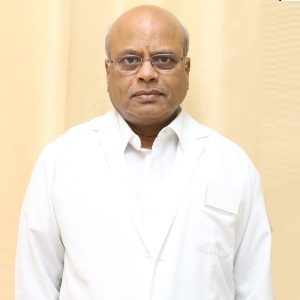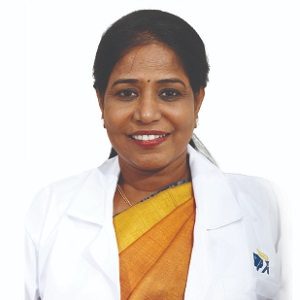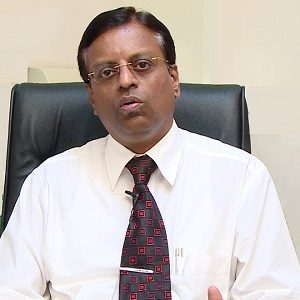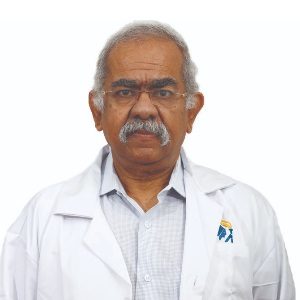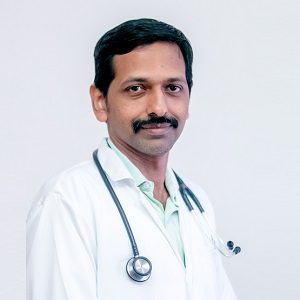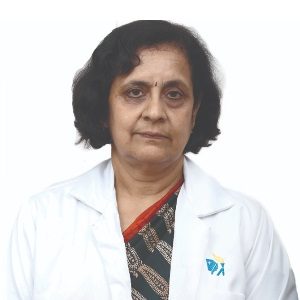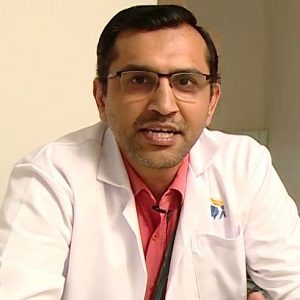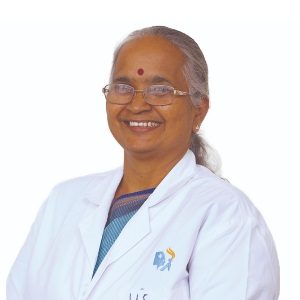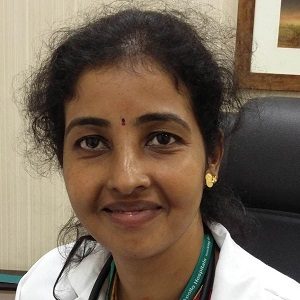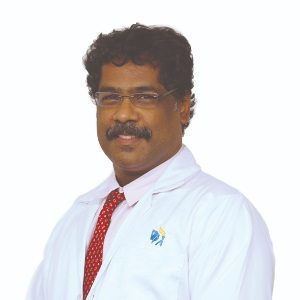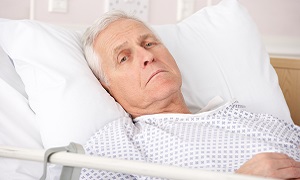Best Doctors in India for Sigmoidoscopy
- Surgical Gastroenterologist, Chennai, India
- Over 27 years’ experience
Profile Highlights:
- Dr. Surendran R is an experienced gastroenterologist from Chennai, Tamil Nadu.
- He has been rewarded for his contributions to the field several times. He received The Best Doctor award from the Tamil Nadu government (2002) in his name.
- Being a gastroenterologist, he specializes in treating patients with problems such as Bowel Obstruction, Pancreatic diseases, Esophagus disorders, Fistula treatment, etc.
- Gastroenterologist and GI Medicine Specialist, Chennai, India
- Over 23 years’ experience
Profile Highlights:
- Dr. Revathy Shanmugam is an experienced Gastroenterologist in Tamil Nadu, having an experience of 23 years in the management of GI disorders, Training & Teaching.
- She is highly skilled in the services like Liver Disease Treatment and Inflammatory Bowel Disease (IBD) Treatment.
- She has published various scholarly works in many National & International Publications of Medical Gastroenterology.
- Gastroenterologist and GI Medicine Specialist, Chennai, India
- Over 32 years’ experience
Profile Highlights:
- Dr. Hariharan Muthuswamy is a veteran Gastroenterologist and Hepatologist in India with 22 years of experience (specialist).
- Dr. Muthuswamy treated his patients with Non-Surgical Piles treatment, Liver Disease Treatment, Hepatitis E, Hepatitis A Treatment and Hepatitis B Treatment, Hemorrhoids Treatment, Colonoscopy, Stomach, and Intestinal Treatments, etc.
- He has a special interest in Capsule Endoscopy, Therapeutic Endoscopy, GERD, and Irritable Bowel Syndrome (IBS).
- Gastroenterologist and GI Medicine Specialist, Chennai, India
- Over 32 years’ experience
Profile Highlights:
- Dr. Mohan A T is a veteran GI medicine specialist in India with an experience of 32 years.
- Dr. Mohan, an alumnus of Madras University, is the Co-Ordinator of the Indian Society of Enteral and Parenteral Nutrition.
- He is an expert in treating Gastritis, acidity, Ulcerative Colitis, and many other Intestinal and bowel-related Treatments. In addition to these, he offers Colonoscopy, Gastroscopy, and Endoscopy.
- Gastroenterologist and GI Medicine Specialist, Chennai, India
- Over 15 years’ experience
Profile Highlights:
- Dr. Piramanayagam P is one of the young Gastroenterologists in India, having an experience of 15 years in the field.
- The doctor offer services like Gall Bladder (Biliary) Stone treatment, IBS treatment, Acidity Treatment, Endoscopy, and stomach and intestine dysfunction.
- He published many review articles and books under his name.
- Gastroenterologist and GI Medicine Specialist, Chennai, India
- Over 39 years’ experience
Profile Highlights:
- Dr. Sarojini Parameswaran is one of the renowned Gastroenterologist with an overall experience of 39 years.
- Dr. Parameswaran is brilliant and quick with diagnosis. She has 22 years of specialist experience.
- Gastroenterologist and GI Medicine Specialist, Chennai, India
- Over 24 years’ experience
Profile Highlights:
- Dr. Seshadri Venkatesh P is a well-known Gastroenterologist in India, having 24 years of experience in Stomach and Intestine disorders.
- Dr. Seshadri acquired proficiency in managing Bladder Cancer surgery, hemorrhoids, Irritable Bowel Syndrome (IBS) Treatment, etc.
- He holds membership in Tamil Nadu Medical Council.
- Gastroenterologist and GI Medicine Specialist, Chennai, India
- Over 40 years’ experience
Profile Highlights:
- Dr. Usha Srinivas is a Gastroenterologist in India with an experience of 40+ years in GI in medicine and academics.
- Patients visit her for consultation and treatment of abdominal pain, Gall Bladder (Biliary) Stone, Gastroenteritis, Jaundice, Colonoscopy, Steatosis, Constipation Treatment, Hepatitis C Treatment, Hepatitis E Treatment, Hemorrhoids Treatment, Piles Treatment (Non-Surgical), Gastritis Treatment, Ulcerative Colitis Treatment, and others.
- Gastroenterologist and GI Medicine Specialist, Chennai, India
- Over 18 years’ experience
Profile Highlights:
- Dr. Preethi M is one of the best gastroenterologists in India, with 18 years of expertise.
- Dr. Preethi received many awards for her contribution to the field.
- She offers consultation for Irritable Bowel Syndrome (IBS), Hemorrhoids, Endoscopy, female problems, and other gastrointestinal issues.
- Gastroenterologist and GI Medicine Specialist, Chennai, India
- Over 23 years’ experience
Profile Highlights:
- Dr. Ubal Dhus is a GI specialist doctor in South India who is proficiently managing Gastroenterological disorders for the past 23 years.
- He acquired his medical degree from Madras University, Chennai, and served people with Hemorrhoids Treatment, and Irritable Bowel Syndrome (IBS) Treatment.
Best Hospitals in India for Sigmoidoscopy
Venkateshwar Hospital, Dwarka, New Delhi
- City: New Delhi, India
Hospital Highlights:
- State-of-the-art technology and devoted healthcare professionals have been brought together under one roof at Venkateshwar Hospital to provide genuine medical care. The hospital’s professionals work together as a team to deliver the best possible treatment to their patients, using the most sophisticated equipment and information technology.
- Venkateshwar Hospital’s mission is to attain global excellence in healthcare by employing evidence-based, ethical clinical practices and cutting-edge technology by a team of highly skilled experts.
MGM Healthcare, Chennai
- City: Chennai, India
Hospital Highlights:
- Located in Chennai, India, MGM Healthcare is a top multispecialty hospital that provides all medical services under one roof.
- Since its founding in 2019, MGM Healthcare has quickly become a leading national referral centre, creating several innovative flagship initiatives.
- MGM Healthcare combines next-generation medical and digital technologies to provide better patient results.
- With 12 centres of excellence, more than 400 inpatient beds, 100 intensive care unit beds, and 24/7 emergency care, MGM Healthcare leaves no chance in redefining the patient experience in Chennai.
- MGM Healthcare boasts 250+ expert doctors across 30+ departments, including Cardiology, Pulmonology, Neurology, Obstetrics & Gynaecology, and more.
- They house 12 specialized Centres of Excellence, including Neurosciences, Orthopaedics, and Multi-Organ Transplantation.
- Their team of doctors, nurses, and paramedics works together to give every patient individualized treatment.
Sigmoidoscopy
Sigmoidoscopy is a test where your doctor examines the rectum and lower part of the colon. The colon is your large intestine and its lower part is known as the sigmoid colon. The sigmoid colon ends in your rectum, where the waste is collected before it leaves your body when you are having a bowel movement.
Sigmoidoscopy, which is also termed as flexible sigmoidoscopy, can help your doctor to look for ulcers, cancer, polyps or abnormal cells. In this procedure, typically tissues are taken as samples for checking for any abnormal changes in the cells.
Purpose
Sigmoidoscopy can help your doctor investigate possible causes of abdominal pain, changes in bowel habits, rectal bleeding, chronic diarrhea or any other problems related to the intestine.
If you are over 50 years of age, it puts you at average risk for colon cancer, which is why your doctor may recommend a flexible sigmoidoscopy exam every five years to screen for colon cancer.
Though sigmoidoscopy helps in screening for colon cancer screening, there are other options as well, which can allow your doctor to view the whole colon, such as colonoscopy.
Occasionally, sigmoidoscopy is preferred over colonoscopy as it takes lesser time, and doesn’t require an anesthetic. There are also lower risks.
Preparation
Before going through a sigmoidoscopy exam, it is important to empty your colon. If there is any residue in your colon, it can obscure the view of your colon and rectum during the procedure.
To empty your colon, it is important to carefully follow your doctor’s instructions. Your doctor might ask you not to consume any food the day before you undergo the exam. Instead, you can consume plain water, carbonated beverages, broth as well as tea and coffee without any milk or cream. The doctor may also ask you not to eat or drink anything after midnight the night before your exam.
Your doctor may ask you to take a laxative, which will be either in pill or liquid form.
You will also need to use an over-the-counter enema kit, typically a few hours before the exam, for emptying your colon. You might also be asked to take two enemas.
If you take medications or supplements, remind your doctor about them at least a week before the exam. You may need to temporarily stop the medications or adjust the dosages for some time.
Procedure
You’ll need to wear a gown and begin the exam lying on your left side on the exam table. Then you need to draw your knees toward your abdomen. Then the sigmoidoscope, which is a thin and flexible tube, will be inserted into your rectum. The tube has a light as well as a very small camera on the end, which helps images to be transmitted onto a monitor for the doctor to see. The tube also inflates your colon with some air, making it easier for your doctor to examine.
Please note that when the scope is moved or air is introduced, you might experience abdominal cramping or the urge to move your bowels.
This exam should take around 15 minutes. If biopsies are taken, it may require slightly more time. Usually, sedation and pain medications aren’t required. If a polyp is found, your doctor might recommend a full colonoscopy to examine the entire colon, as there might be other polyps present further up in the colon.
After the procedure
After the exam, you should be able to return to your usual diet and activities. However, you might experience mild discomfort after the exam. You might feel bloated or pass gas for some hours as the air is cleared from your colon. Walking should help relieve the discomfort.
You might also notice a little blood with your first bowel movement after the exam, for which there is no reason to worry. You can consult your doctor if you continue to pass blood or blood clots or if you experience persistent abdominal pain or a fever of 100 F or higher.
If your results are negative, that means your doctor hasn’t found any abnormalities in your colon. If you’re above fifty years of age, then you may be at average risk of colon cancer. So your doctors can recommend the exam again after five years.
If your results are positive that means your doctor found polyps or abnormal tissues in your colon. You might require additional testing, such as colonoscopy, depending on the findings. The abnormalities will be examined more thoroughly, biopsied or removed.

